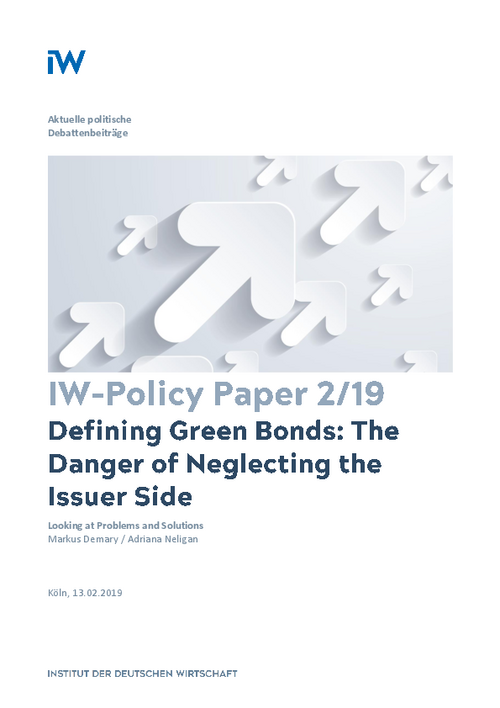The European Union is currently making significant strides to lead on green finance and align its financial system with its climate, sustainability and clean energy ambitions. To this end, the European Commission presented three legislative proposals on sustainable finance in May 2018.

Defining Green Bonds: The Danger of Neglecting the Issuer Side
IW Policy Paper

The European Union is currently making significant strides to lead on green finance and align its financial system with its climate, sustainability and clean energy ambitions. To this end, the European Commission presented three legislative proposals on sustainable finance in May 2018.
One of the EU’s main efforts here is to establish a market for green bonds by introducing a common taxonomy. A technical expert group on sustainable finance is currently developing this taxonomy for sustainable finance. However, most experts are from the investor side, while the issuer side is underrepresented in the group. By defining which economic activities are green, the expert group also determines, which economic activities are non-green. Through the taxonomy, the green bond framework will thereby alter the financing conditions for green investments as well as for traditional investments. In our view, the framework on sustainable finance is unbalanced; it emphasizes mostly the investors’ view and less the issuers’ view. Two problems might arise from this: First, it does not adequately address the contribution of intermediate goods producers to green final products, and second, the contribution of non-green investments to CO2-reduction with the consequence that their financing costs might rise through a green bond framework.
Our first recommendation is, that the expert group should shift its focus away from single green products towards the green value chain. This approach would allow intermediate good producers of non-green products to issue green bonds if they contribute to green final products. If the issuer of an intermediate product could prove that, for example, 20 percent of its sales contribute to a green final product, the issuer should be allowed to structure the issuance by distributing 20 percent of the issuance volume as green bonds and the remaining 80 percent as conventional bonds. Considering the green value chain is important, since the financing costs of intermediate products will contribute to the production costs of green final products.
Our second recommendation is that businesses should at least in part be allowed to issue green bonds if they invest in technologies that reduce their CO2-emissions significantly. Their production does not fall under the definition of green products, but these firms could also contribute to greening the economy by investing in emission-reducing and energy-saving technologies. Embracing these issuers into the sustainable finance framework would set them incentives to invest into lowering their CO2-emissions.

Markus Demary / Adriana Neligan: Defining Green Bonds – The Danger of Neglecting the Issuer Side
IW Policy Paper


33. Finanzmarkt Round-Table: De-Industrialisierung – Gefahr für den Finanz- und Wirtschaftsstandort Deutschland?
Das Institut der deutschen Wirtschaft, die DekaBank und die Börsen-Zeitung laden Sie zum Finanzmarkt Round-Table am Montag, den 29. April 2024 von 10:30 bis 12:30 Uhr ein. Der Round-Table findet als Online-Veranstaltung statt.
IW
Deindustrialisierung: Aktuelle Entwicklungen von Direktinvestitionen
Obwohl sich die Situation bei den Energiekosten nach den Turbulenzen der letzten Jahre wieder etwas entspannt hat, sehen wir weiterhin hohe (Netto-)Abflüsse von Direktinvestitionen aus Deutschland. Das deutet darauf hin, dass die Perspektiven am Standort ...
IW